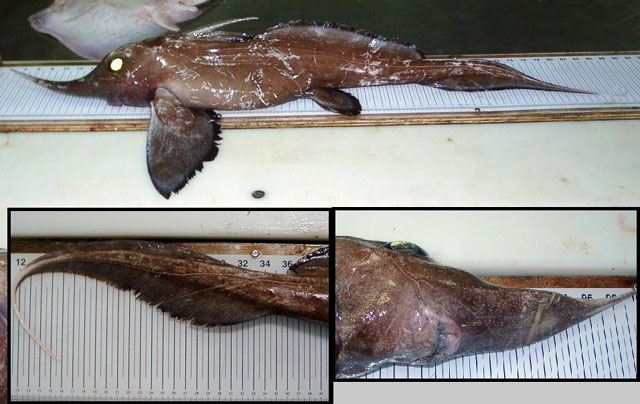| Rhinochimaeridae (Longnose chimaeras) |
| 120 cm OT (male/unsexed); 102.5 cm TL (female); max.weight: 1,625.0 g |
|
bathydemersal; marine; depth range 200 - 3100 m |
| Cosmopolitan, |
|
This species is distinguished from H. chaetirhampha by the following characters: H. raleighana with eye small, its length 7% BDL (vs. 7-9% in H. chaetirhampha); interorbital space broad, 11-16% BDL (vs. 6-9%); snout tip smooth (vs. armed with small knob-like projections; only prominent in male); first dorsal fin low, length of dorsal spine anterior margin 16% BDL (vs. 19-24%); pectoral and pelvic fins broadly rounded (vs. bluntly
pointed); interdorsal space narrow, 4.5-8.4% BDL (vs. 24.8-26.8%); length of caudal dorsal margin (CDM) longer (vs. shorter) than caudal ventral margin, CDM 74-79% BDL (vs. 49-62%); length of caudal upper ray (CUR) longer (vs. shorter) than that of lower ray, CUR 10-11% BDL (vs. 4-5%); infraorbital canal strongly curved anterior to eye, forming S-shaped loop (vs. only gently curved); with distinct longer and thicker claspers, its outer length 25% BDL (vs. 16%) and its base width 3% BDL (vs. 1%); tip of the clasper excessively inflated so as to form a large, elongate and fleshy knob, covered with 16 (17 in right side) small, multifaceted, hemp-leaf shaped spines, most of which were serially arranged along its dorsomesial margin (vs. small bulb, with several simple spines sparsely distributed); a deep slit running longitudinally from dorsolateral base of rod to the ventromesial surface of the knob, running along the dorsal side of the clasper( vs. not prominent) (Ref. 123553). |
| Found on the continental slope and ocean floor (Ref. 26346). Appears to feed mainly on shellfish and crustaceans (Ref. 6871). Maximum length 120 cm without tail filament (Ref. 26346). It is captured as by-catch in deep water trawl fisheries (Ref. 117245). |
|
Least Concern (LC); Date assessed: 19 February 2015 Ref. (130435)
|
| harmless |
Source and more info: www.fishbase.org. For personal, classroom, and other internal use only. Not for publication.
